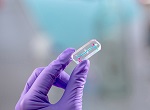Science and Engineering
 Caffeine could slow cellular ageing: new research shows how
Caffeine could slow cellular ageing: new research shows how25 June 2025
A new study from the Cellular Ageing and Senescence laboratory at Queen Mary University of London’s Centre for Molecular Cell Biology, reveals how caffeine —the world’s most popular neuroactive compound—might do more than just wake you up. The study in the journal Microbial Cell shows how caffeine could play a role in slowing down the ageing process at a cellular level.
 ADHD link to severe premenstrual disorder uncovered in women
ADHD link to severe premenstrual disorder uncovered in women23 June 2025
New study reveals women with ADHD are significantly more likely to suffer from PMDD, highlighting a critical overlooked health risk.
 Scientists find new way to predict how bowel cancer drugs will stop working – paving the way for smarter treatments
Scientists find new way to predict how bowel cancer drugs will stop working – paving the way for smarter treatments20 June 2025
Scientists have developed a tool that can predict how bowel cancer adapts to treatment – helping researchers to design new personalised drugs that will keep patients living well for longer.
 Professor Andrew Livingston celebrated for double honours in chemical engineering
Professor Andrew Livingston celebrated for double honours in chemical engineering20 June 2025
A remarkable week for Professor Andrew Livingston saw him recognised with two significant accolades: a prestigious Lifetime Achievement Award from the World Chemical Engineering Council (WCEC) on Thursday, 19th June, and a substantial grant from UKRI's Engineering and Physical Sciences Research Council (EPSRC) announced today, 20th June.
 Robotic hand with human-like touch set to revolutionise dexterous manipulation
Robotic hand with human-like touch set to revolutionise dexterous manipulation9 June 2025
New study introduces the F-TAC Hand, a biomimetic robotic hand with unprecedented tactile sensitivity, revolutionising dexterous manipulation in dynamic environments
 Cellular scaffolding secrets unlocked: scientists discover key to microtubule growth
Cellular scaffolding secrets unlocked: scientists discover key to microtubule growth30 May 2025
Scientists found out how naturally unstable filaments decide whether to grow or to shorten.
 Electrophysiology at atomic resolution: scientists simulate ion channel currents with unprecedented
Electrophysiology at atomic resolution: scientists simulate ion channel currents with unprecedented21 May 2025
Breakthrough study reveals how potassium ions flow through channels in cells – with implications for drug development and understanding neural signalling
 Light-to-electricity nanodevice reveals how Earth’s oldest surviving cyanobacteria worked
Light-to-electricity nanodevice reveals how Earth’s oldest surviving cyanobacteria worked16 May 2025
Atomic-level snapshot of a 3-billion-year-old photosynthetic assembly shows life nailed the design early.
 New insights into black hole scattering and gravitational waves unveiled
New insights into black hole scattering and gravitational waves unveiled15 May 2025
A landmark study published in Nature has established a new benchmark in modelling the universe’s most extreme events: the collisions of black holes and neutron stars.
 Queen Mary scientists achieve micro-scale breakthrough with big promise
Queen Mary scientists achieve micro-scale breakthrough with big promise13 May 2025
New techniques to mimic the complexity of living human organs provide an alternative to using animals in science
 Queen Mary University of London to play key role in new UK Multidisciplinary Centre for Neuromorphic Computing
Queen Mary University of London to play key role in new UK Multidisciplinary Centre for Neuromorphic Computing--by-Pinglabel-small.jpg) Atom-thin semiconductors could cut energy use by over 90%
Atom-thin semiconductors could cut energy use by over 90%  A vast molecular cloud, long invisible, is discovered near the solar system
A vast molecular cloud, long invisible, is discovered near the solar system New study reveals critical gaps in insect biodiversity research
New study reveals critical gaps in insect biodiversity research Biologists discover ancient neurohormone that controls appetite
Biologists discover ancient neurohormone that controls appetite Climate change fuelling mental health crisis in areas most affected by climate crisis
Climate change fuelling mental health crisis in areas most affected by climate crisis UK-led breakthrough offers path to stable, low-cost solar hydrogen production
UK-led breakthrough offers path to stable, low-cost solar hydrogen production What do pesticides do to bumble bee brains over time?
What do pesticides do to bumble bee brains over time? The quest for room-temperature superconductors
The quest for room-temperature superconductors The art of well-being: group activities shown to ease depression and anxiety in older adults
The art of well-being: group activities shown to ease depression and anxiety in older adults Gravity from entropy: A radical new approach to unifying quantum mechanics and general relativity
Gravity from entropy: A radical new approach to unifying quantum mechanics and general relativity Queen Mary University of London opens one of Europe’s largest organ-on-a-chip facilities
Queen Mary University of London opens one of Europe’s largest organ-on-a-chip facilities  Groundbreaking study reveals how topology drives complexity in brain, climate, and AI
Groundbreaking study reveals how topology drives complexity in brain, climate, and AI A Night of Science and Engineering: exploring Tomorrow’s World at Queen Mary
A Night of Science and Engineering: exploring Tomorrow’s World at Queen Mary  Queen Mary PhD student contributed to the new generative AI model in gameplay creativity
Queen Mary PhD student contributed to the new generative AI model in gameplay creativity Queen Mary welcomes new Royal Society URF awardee to lead exoplanet research project
Queen Mary welcomes new Royal Society URF awardee to lead exoplanet research project Pesticide impacts on bees more complex than expected
Pesticide impacts on bees more complex than expected Queen Mary academic contributes to groundbreaking study on Nord Stream methane emissions
Queen Mary academic contributes to groundbreaking study on Nord Stream methane emissions
 Breakthrough study reveals the secrets behind cordierite’s anomalous thermal expansion
Breakthrough study reveals the secrets behind cordierite’s anomalous thermal expansion